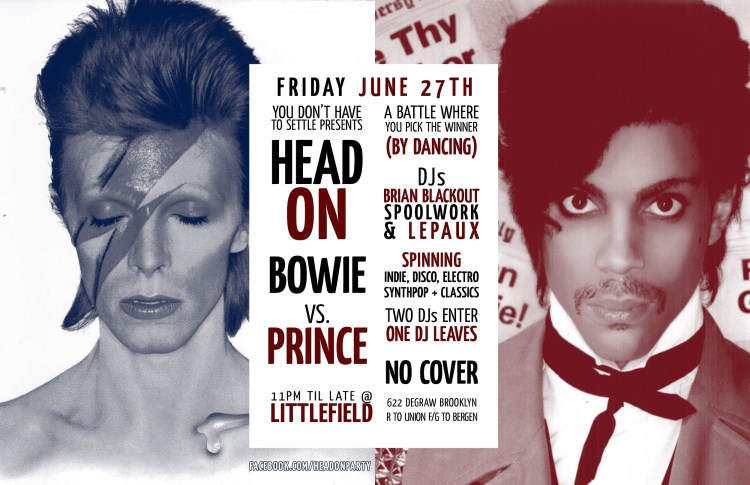Musically speaking, there wasn’t a huge amount of overlap between David Bowie and Prince, the major pop icons who died this year.
Still, there were some important similarities. Many people will point to an obvious one: the occasional adoption of androgynous personas.
But I’m thinking of something more fundamental. Both men were insanely prolific. And while they each briefly enjoyed major pop chart success and sales status during their careers, they generally churned out massive catalogs without regard to sales or popular acclaim.
When I think of both artists, I think of lines from the musical “Hamilton.” Both men were “non-stop,” artists who really wrote “like they were running out of time.”
Now, however, one of their biggest differences has become glaringly apparent: their attitudes toward technology and music streaming.
Throughout his career, Bowie was an early adopter of new modes of delivering music, having once even launched his own ISP. Prince, on the other hand, was suspicious and disdainful of the same trends, particularly of streaming music services and the economics behind them.
I certainly understand that there are reasonable debates about compensation and fairness around artists and music streaming services. But it’s a shame that most of Prince’s music is locked away at this particular moment. Because most likely, the result will be that much of his catalog will be ignored, forgotten, and undiscovered by future generations.
This is something my recent experience with Bowie’s death taught me. Like many people, I counted myself as a lifelong Bowie fan. But in truth, that meant that I was mostly familiar with this ’70s and ’80s hits. I hadn’t listened to a Bowie record that was made after 1992.
So upon hearing of his death, I decided to listen to his whole catalog straight through on Spotify. He released 27 studio albums, so this amounted to a couple of months of casual listening.
That marathon completely changed my appreciation for his music. Bowie was incredibly restless, shifting styles constantly, pounding out records in just a couple of weeks, and then moving right on to the next thing.
Much of his music was intensely inaccessible to a casual listener. A lot of it was just terrible. But either way, he didn’t seem to care what this would mean in a commercial sense. He was already moving along.
He made 13 albums between 1969 and 1980. The rest of the ’80s were his most commercially successful period, but also his least productive: just 4 albums, including the first Tin Machine record.
By the early ’90s, he had fallen off the commercial radio radar in the U.S., for the most part. But creatively, this seemed to put him back on track, and he made seven records between 1993 and 2003. After that, he seemed to effectively go into retirement, until suddenly reappearing with two records before his death.
To be sure, there is a crazy amount of crap in that catalog. Many more misses than hits. But as I listened, I found myself more and more understanding, at least of what he was trying to do. And I found myself discovering a huge number of tracks that I had never heard, from albums I didn’t even know existed.
And that’s the thing about music streaming and subscriptions. There is no way on earth I would buy 27 albums at $15 a pop to dig into someone’s catalog like that. But with the entire catalog on streaming services, it was easy to explore and find a whole new layer to his work.
Along the way, I made a playlist of 106 songs. Here, let me share it with you:
Since we learned that Prince died yesterday, my friends who are true fans have been flooding their Facebook feeds with lists of their favorite songs and albums, particularly the obscure, late career ones. Prince was one of the few artists who could make Bowie look like a slouch: 39 studio albums over almost 38 years.
Prince’s catalog is only available online through the artist-backed Tidal music streaming service. I can’t blame him. Tidal offers double the royalties of other music streaming services, and has no free tier.
But otherwise, Prince’s catalog is pretty much locked away as far as users of Spotify, Apple Music, Amazon, and Google Play are concerned. Tidal, naturally, is using that exclusivity to promote itself.
“The catalog has to be protected,” Prince told Billboard. “And some of our fans were actually disingenuous. Taking the time to get their playlists together and yeah, it’s gone. Now you got to actually go subscribe to get the music that you lost on Spotify. Spotify wasn’t paying, so you gotta shut it down.”
Again, I understand that impulse. But it’s a shame.
Because I think that, in an era when consumers are clearly choosing streaming, it means that Prince’s impact on future generations will be more limited than it should be.
His legacy will be diminished, while Bowie’s will only grow over time.
VentureBeat's mission is to be a digital town square for technical decision-makers to gain knowledge about transformative enterprise technology and transact. Learn More

